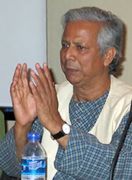Peter Bohan, writing for
Reuters/Planet Ark, reports this morning on the conference of Midwest (U.S.) investors who gathered at the University of Chicago Business School a week ago.
The conference was organized by the
Investor Network on Climate Risk (INCR), a program of
Ceres, the "national network of investors, environmental organizations and other public interest groups working with companies and investors to address sustainability challenges such as global climate change." It follows on the heals of a
disclosure reporting framework advocated by Institutional Investors earlier this
fall.
Bohan notes that the talk was sobering, writing that the consensus "was that institutional investors are still too near-sighted to factor climate change into their investment decisions." William Page, a portfolio manager at State Street Global Advisors, told Bohan, "The value proposition is one the Street isn't really recognizing."
He also quotes Michael Moran, vice president of global investment research at Goldman, Sachs & Co., who said that Wall Street "was still taking its first steps. 'The first step to recovery is acknowledging you have a problem.'"
At issue is capital that is centered around short-term strategies, such as hedge funds and mutual funds. As Moran told Bohan, "They say: 'I understand climate change. I think it's a big risk. But you are talking about long-term issues. I get evaluated every three months. I get a percentage on this year's profits.'" Individual investors may have a longer view, it was noted.
Bohan reports that Richard Sandor, head of the
Chicago Climate Exchange, and others encouraged "every institutional investor to push companies to evaluate and estimate their climate risk."
The risks from liability may be particularly onerous. Such risks are being scrutinized by the insurance industry in a major way, because of the potential impacts on that industry.
Bohan suggests that damage from last year's Hurricane Katrina -- an event that can not be directly linked to climate change -- at "about US$125 billion...with US$45 billion covered by private insurers."
Conference participants, according to Bohan, "agreed to keep pushing companies to disclose their climate risk and to press the Securities and Exchange Commission to encourage such disclosure."
While it's easy to focus on the risks, investors may want to look more closely at potential solutions to the climate change crisis. Green technologies or "Clean Tech" industries may provide investment opportunities. A recent analysis in
The Economist suggested that sector is growing, reporting that analysts "confidently predict the clean-energy business will grow by 20-30 percent a year for a decade." But, they also warn the sector is not without pitfalls for investors.
Still, for many industries, looking beyond the risks to taking proactive steps to adapt and stay ahead of regulation may be a windfall.
Writing in the
Chicago Sun-Times last week, Tim Wagner, director of the Nebraska Department of Insurance and co-chair of the Climate Change Executive Task Force of the National Association of Insurance Commissioners, and Ceres president Mindy Lubber, stated that "carmakers and power providers that look around the curve and begin implementing strategies to reduce emissions and operate with greater energy efficiency will have a significant competitive edge over those that do not."
Other companies that promote "alternative energies such as bio-based fuels will reap the financial benefits of their foresight," Wagner and Lubber write, "and, in fact, already are doing so."
Read more:
Peter BohanCategories: climate change, global warming, innovation, economy










